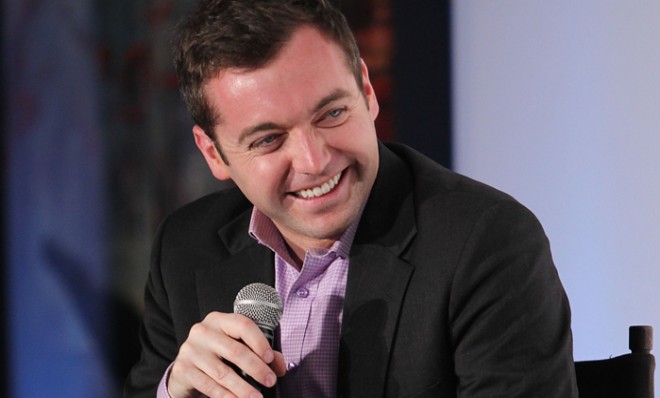Michael Hastings, remembered
A young war journalist dies


A free daily email with the biggest news stories of the day – and the best features from TheWeek.com
You are now subscribed
Your newsletter sign-up was successful
Michael Hastings was the type of national security reporter I didn't have the guts to be.
"A dick?"
I guess — well, yes. A dick. A dick to those in power. Fearless. Someone who didn't care what others thought of him.
The Week
Escape your echo chamber. Get the facts behind the news, plus analysis from multiple perspectives.

Sign up for The Week's Free Newsletters
From our morning news briefing to a weekly Good News Newsletter, get the best of The Week delivered directly to your inbox.
From our morning news briefing to a weekly Good News Newsletter, get the best of The Week delivered directly to your inbox.
I had given the news of Hastings' death to a military contact of mine, someone who venerated one of the men that Hastings did not, and my contact was very rude and blunt in his assessment. Hastings had been, apparently, a dick to him.
I didn't know Hastings well. We exchanged emails a few times.
I do know that he was actively disliked by government higher-ups. He was a rule-breaker. He didn't follow tradition, or customs, or habit. He was not deferential.
From my limited interactions with Hastings, I could tell that he thrived off of that defiance. He found the relationship between war reporters and the generals and admirals they cover to be much too cozy, and then he went along and did something about it.
A free daily email with the biggest news stories of the day – and the best features from TheWeek.com
He forced the Pope, Gen. Stanley McChrystal — a decorated Ranger, the commander of U.S. forces in Afghanistan, and a former commanding general of the Joint Special Operations Command — to abdicate his throne. And then he wrote a book about it.
I place Hastings in a cadre of other young writers (Jeremy Scahill and Daphne Eviatar are two) who rigorously interrogate powerful interests and become advocates for those bullied by government power. They see generals and admirals and wonder not how to cultivate them as sources but instead what they're doing to abuse their power.
Unlike muckrackers of the past — Jack Anderson comes to mind — they don't make deals with the devil to bring down other devils. Eviatar is simply tenacious. Scahill is relentless. Stories in search of unflinching, uncompromising advocates seem to be attracted to their energy.
I am no Michael Hastings and I probably never will be. My temperament and orientation is different. I approach my subjects from a different angle and I ask different questions. I do pretty well for myself.
But when I'm in the arena with people like Hastings, I'm always forced to check myself. This continuing, largely backgrounded argument between those who want to blow the house down and those who want to renovate it is valuable for journalism. It sharpens our edges and keeps those in power constantly guessing.
Hastings was a combatant.
He died yesterday in a car crash a few miles from where I live. He leaves behind a wife, Elise, and many, many friends.
Marc Ambinder is TheWeek.com's editor-at-large. He is the author, with D.B. Grady, of The Command and Deep State: Inside the Government Secrecy Industry. Marc is also a contributing editor for The Atlantic and GQ. Formerly, he served as White House correspondent for National Journal, chief political consultant for CBS News, and politics editor at The Atlantic. Marc is a 2001 graduate of Harvard. He is married to Michael Park, a corporate strategy consultant, and lives in Los Angeles.
-
 The environmental cost of GLP-1s
The environmental cost of GLP-1sThe explainer Producing the drugs is a dirty process
-
 Greenland’s capital becomes ground zero for the country’s diplomatic straits
Greenland’s capital becomes ground zero for the country’s diplomatic straitsIN THE SPOTLIGHT A flurry of new consular activity in Nuuk shows how important Greenland has become to Europeans’ anxiety about American imperialism
-
 ‘This is something that happens all too often’
‘This is something that happens all too often’Instant Opinion Opinion, comment and editorials of the day
-
 Why Puerto Rico is starving
Why Puerto Rico is starvingThe Explainer Thanks to poor policy design, congressional dithering, and a hostile White House, hundreds of thousands of the most vulnerable Puerto Ricans are about to go hungry
-
 Why on Earth does the Olympics still refer to hundreds of athletes as 'ladies'?
Why on Earth does the Olympics still refer to hundreds of athletes as 'ladies'?The Explainer Stop it. Just stop.
-
 How to ride out the apocalypse in a big city
How to ride out the apocalypse in a big cityThe Explainer So you live in a city and don't want to die a fiery death ...
-
 Puerto Rico, lost in limbo
Puerto Rico, lost in limboThe Explainer Puerto Ricans are Americans, but have a vague legal status that will impair the island's recovery
-
 American barbarism
American barbarismThe Explainer What the Las Vegas massacre reveals about the veneer of our civilization
-
 Welfare's customer service problem
Welfare's customer service problemThe Explainer Its intentionally mean bureaucracy is crushing poor Americans
-
 Nothing about 'blood and soil' is American
Nothing about 'blood and soil' is AmericanThe Explainer Here's what the vile neo-Nazi slogan really means
-
 Don't let cell phones ruin America's national parks
Don't let cell phones ruin America's national parksThe Explainer As John Muir wrote, "Only by going alone in silence ... can one truly get into the heart of the wilderness"
